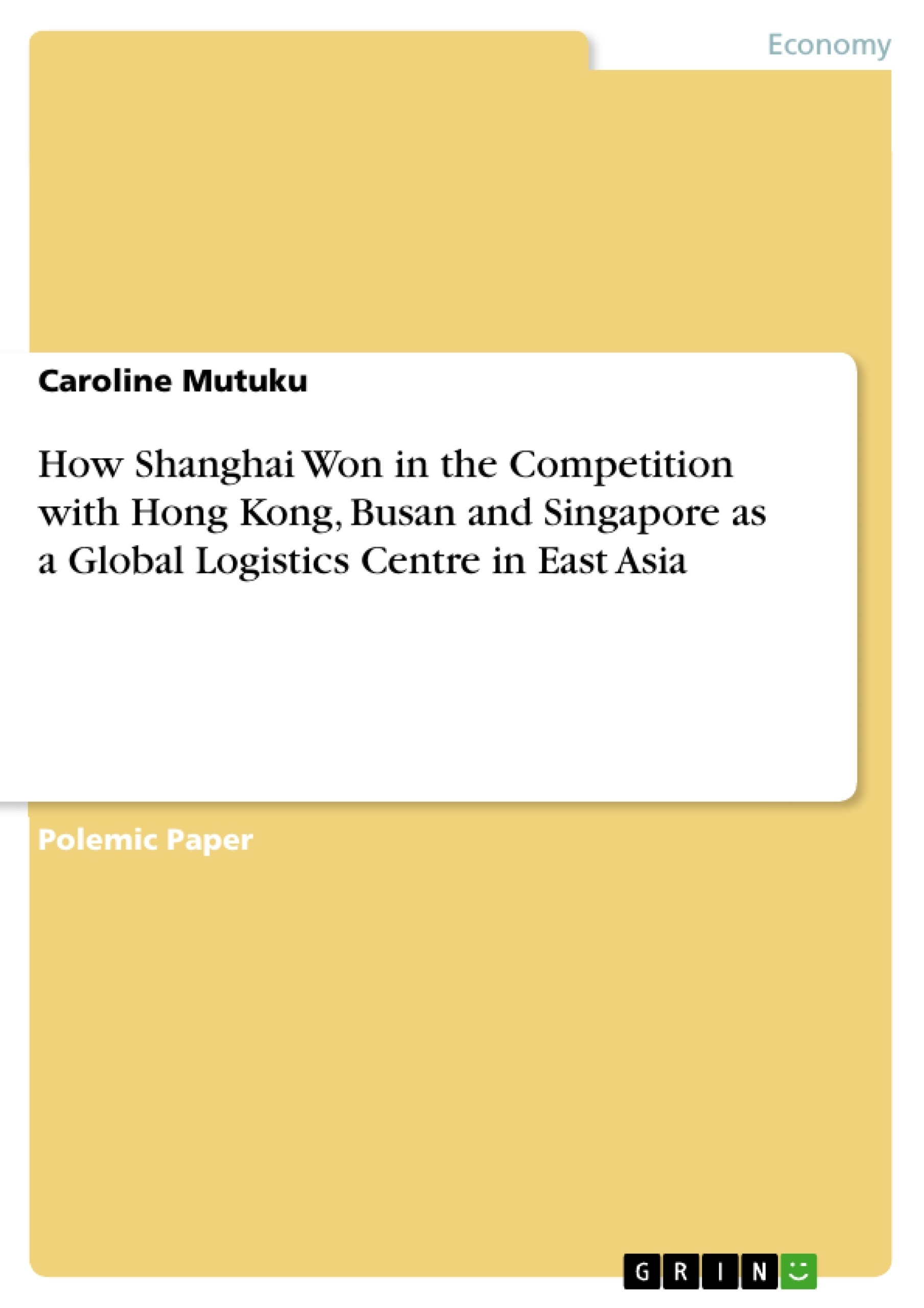Excerpt
Introduction
Shanghai appears to be facing enormous challenges in developing into a global logistics center in East Asia owing to the steep competition from Singapore, Hong Kong and Busan. These cities share geographical features primarily with regard access, and they are known to host the top five international seaports in the Asian continent. Their strategic location has been found to be one of the most significant features which have enabled the Asia-Pacific Region, primarily East Asia to experience extensive expansion in global logistics and business leaders in the Asian continent (p. 95)[1]. For instance, Singapore’s logistic capabilities have enabled it to become a global hub for foreign multinational corporations. It has also experienced logistic development in transportation, financial, commercial and telecommunication sectors (p. 267)[2]. On the other hand, Hong Kong has been experiencing extensive economic development owing to the impacts of globalization and urbanization which seem to have enhanced its logistic capabilities. It is believed that Busan, Korea’s second largest city does not pose great competition to Shanghai as it is the case with Singapore and Hong Kong. However, its rapid expansion in the recent years implies the advancement of its logistic capabilities, so it may become a significant competitor as a global logistics center in the region. Economic models indicate that Shanghai possess a competitive advantage in global logistics, owing to its expansion in the hospitality industry which seem to have attracted foreign multinational corporations. It is predicted that Shanghai will win in competition with Busan, Hong Kong and Singapore as a global logistics center if its logistic strategies are implemented. It is also favored by the current wave of globalization because it has seemingly become one of the most preferred destinations by foreign investors. Therefore, this research paper will discuss several ways on how Shanghai can win in competition with Singapore, Hong Kong and Busan as a global logistics center in the next decade.
Shanghai’s Developmental Strategies to win Hong Kong
Shanghai and Hong Kong have been engaging in an economic struggle because they share most economic characteristics. In the past, Hong Kong has been striding a bit too far ahead of Shanghai, primarily in logistics, but the current advances of Shanghai in establishing a global logistic hub seem to have offered a significant challenge to Hong Kong (p. 195)[3]. It is believed that the foundation for the two cities is based on global economic integration and historical colonialism, which have enabled them to emerge as global financial centers. However, Hong Kong is believed to have flourished rapidly in the post war era while Shanghai lagged behind in the entrepreneurial perspective. Steinbock (2013) states, “as Shanghai fell into a historical oblivion, Hong Kong thrived, even during the first decade of reforms and opening-up policies because these began in Guangdong. In Shanghai, the development of Pudong was initiated only in 1992” (par. 6)[4].
Recently, Shanghai unveiled a free-trade zone plan which is expected to spur it to great economic prosperity. This may transform Shanghai into a global financial hub in the next decade; thus, outcompeting Hong Kong in the global logistics.
Despite Hong Kong’s advancement in harnessing wealth in the region, Steinbock (2013) observes “In this transition, Shanghai will have the driving role as China's emerging global financial hub” (par. 7)[5]. It is believed that Shanghai’s free-trade suitability will enable it to enhance its competitiveness in the region; thus, posing a significant challenge to Singapore which is currently endowed with financial resources owing to the establishment of global financial hubs in Singapore.
Hong Kong is also believed to lose its competitiveness in the future because its economic capacity is declining significantly. It is believed that Hong Kong has been affected by the ultra-loose liquidity leading to its decline in property markets, which served as the principal financial driver although it remains on the lead in world-class innovation rankings as compared to Shanghai and Singapore. It is argued “Hong Kong's competitiveness is eroding. In May, it lost its status as the world's most competitive economy in the annual IMD survey; a month later, it plunged from China's second-most competitive region to its fifth in a major think-tank survey” (par. 17)[6].
On the other hand, Shanghai does not seem to be depended on China’s financial share in the global market; thus, its advancement towards the establishment of a global logistic hub will not be influenced by China’s economic status. In contrast, Hong Kong relies heavily on China for financial progress, and this is probably the reason as to why it has recorded stagnant economic development in the last five years. It has been unable to achieve progress without relying on China’s economic growth unlike the case for Shanghai whose financial growth seems to be independent (par. 25)[7]. Therefore, Shanghai’s free-trade zone plan places it far ahead of Hong Kong, primarily in regard to global logistics, and it is expected to emerge a global logistic hub in the future.
It is believed that the free-trade zone plan will lead to the introduction of world-class logistic services, which are expected to enhance business supply chains in the region.
[...]
[1] Chen, H. (n.d.). Harbor City under Globalization: Kaohsiung and Shanghai in Comparison.
[2] Lim, J. & Yue, C. (2003). Singapore: A Regional Hub in ICT.
[3] Gipouloux, F. (2011). The Asian Mediterranean: Port Cities and Trading Networks in China, Japan and South Asia, 13th-21st Century. Northampton, MA: Edward Elgar Publishing.
[4] Steinbock, D. (2013). Shanghai Free-Trade Zone Plan Offers New Challenges To Hong Kong.
[5] Steinbock, D. (2013). Shanghai Free-Trade Zone Plan Offers New Challenges To Hong Kong.
[6] Steinbock, D. (2013). Shanghai Free-Trade Zone Plan Offers New Challenges To Hong Kong.
[7] Steinbock, D. (2013). Shanghai Free-Trade Zone Plan Offers New Challenges To Hong Kong.
- Quote paper
- Caroline Mutuku (Author), 2018, How Shanghai Won in the Competition with Hong Kong, Busan and Singapore as a Global Logistics Centre in East Asia, Munich, GRIN Verlag, https://www.grin.com/document/429720
Publish now - it's free






















Comments